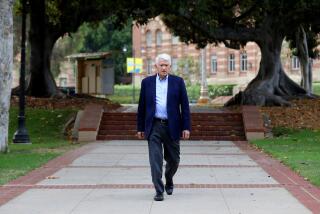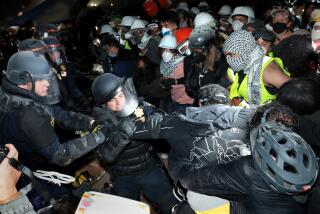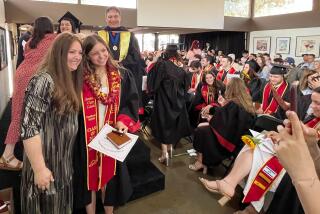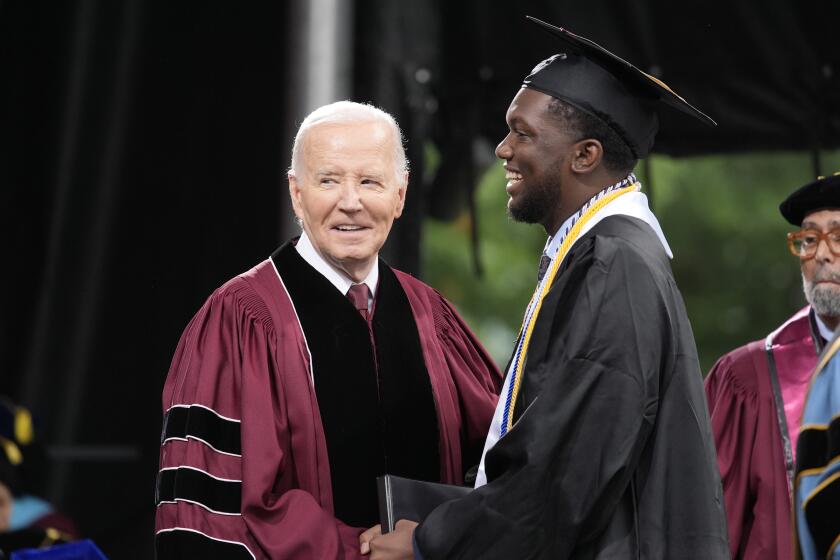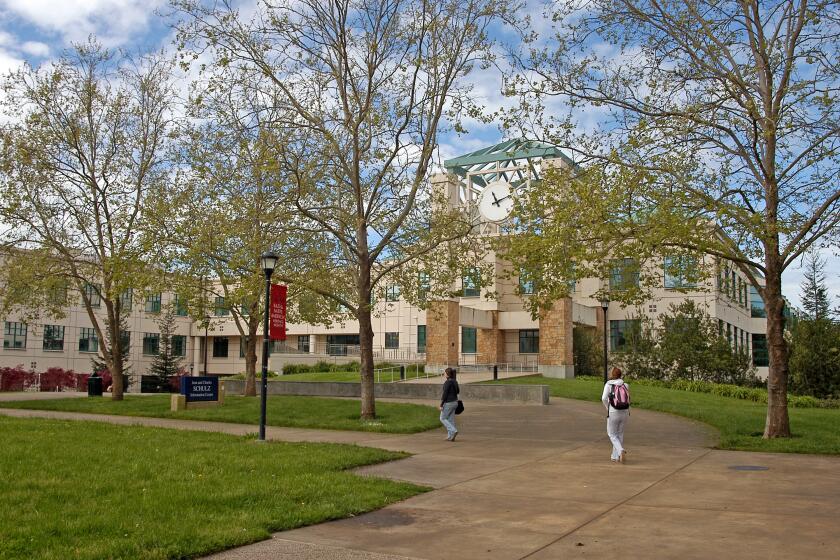USC’s faculty senate censures President Carol Folt and provost over commencement
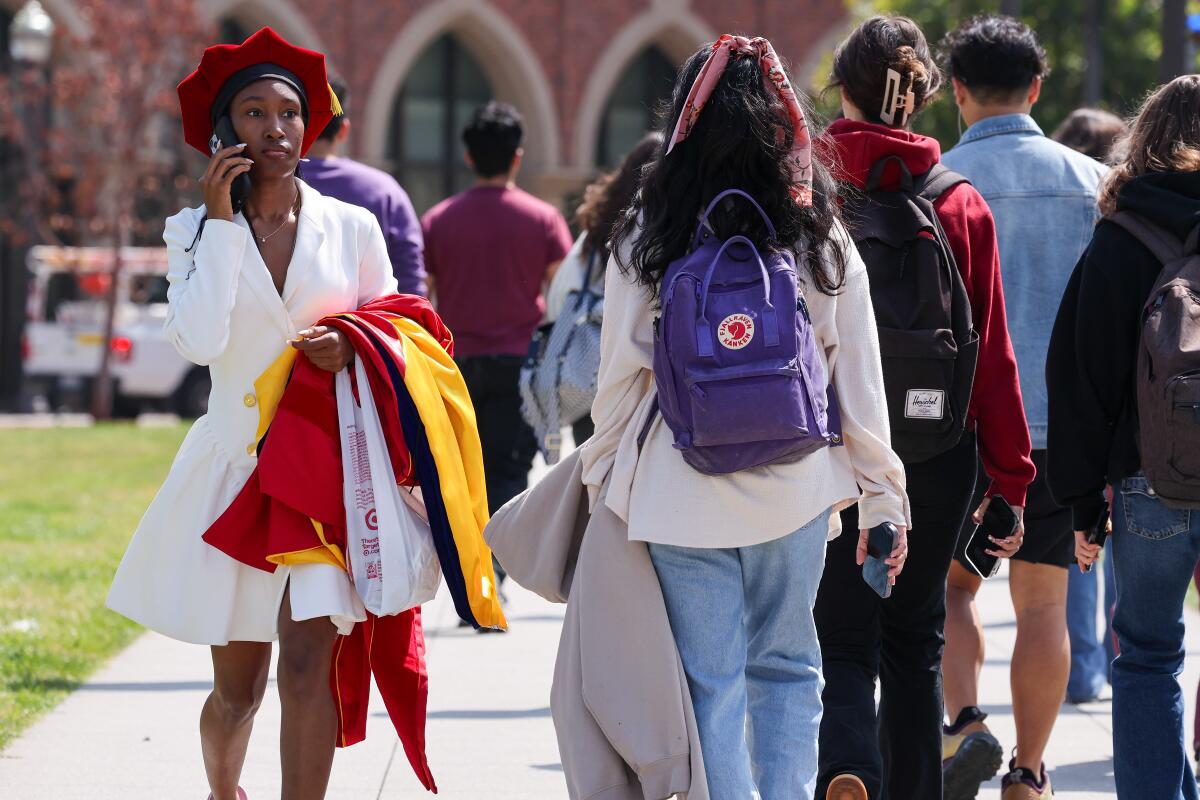
The body that represents USC’s faculty voted Wednesday to censure the university’s president, Carol Folt, and provost, Andrew Guzman, citing both leaders’ mishandling of events around commencement.
The vote by the Academic Senate carries no legal force but was viewed as a public expression of anger, disapproval and frustration among USC’s legion of professors during weeks of turmoil over graduation as well as a broader lack of faith in the pair’s leadership.
The formal censure followed a nearly three-hour meeting in which faculty members criticized decisions by Folt and Guzman, including rescinding the speaking slot of valedictorian Asna Tabassum, a pro-Palestinian Muslim student. The censure was also prompted by dismay over the cancellation of the main-stage commencement ceremony and the posture of administrators toward pro-Palestinian protesters on campus, including the arrest last month by Los Angeles police of 93 protesters, most of whom were students.
“The administration’s actions have been a tragedy of errors, all of them unforced,” said Howard Rodman, professor and former chair of the writing division at the USC School of Cinematic Arts. “President Folt and Andrew Guzman have shown themselves incapable of ethical leadership, even as they flouted any notions of shared governance.”
The resolution voted on by faculty members cited “widespread dissatisfaction and concern among the faculty about administrative actions and decisions” by Folt and Guzman. In the final tally, 21 members favored censuring the president and provost, seven opposed it and six abstained, with approximately three-quarters of senators voting. The Academic Senate is a representative body for USC’s faculty, which numbers more than 4,500. Each of USC’s 21 schools has at least one senator, with each representing roughly 100-200 professors.
The vote comes as UCLA’s Legislative Assembly of the Academic Senate will hold its own emergency meeting Friday to consider proposals to censure or vote no-confidence in Chancellor Gene Block. The UCLA faculty action is prompted by days of upheaval after a mob attack on a pro-Palestinian encampment beginning the night of April 30.

“I understand there are many different viewpoints among members of the Trojan Community regarding our recent decisions,” Folt said in a statement after the vote. “I’m committed to working with the Academic Senate, and the wider faculty who weren’t present at today’s session.”
Folt and Guzman had defended their leadership during the meeting, with Folt calling the current atmosphere at USC a “very humbling moment.”
“I don’t make every decision right, but I try,” she said.
Guzman acknowledged the anger and anguish among faculty.
“We know our decisions will leave people disappointed,” Guzman said. “We are all doing our best to find a way through this moment.”
A cascade of decisions that Folt made this spring around USC’s commencement and Israel-Hamas war-related protests inflamed tensions and opened wounds, presenting the most significant test of her tenure.
The censure vote unfolded amid a ramp-up to graduation festivities on campus this week. Folt said that she and the provost would work with a new faculty task force examining the decisions around commencement and the response to protesters but said, “For now, our focus is on celebrating the 19,000 graduates of USC’s Class of 2024.”
Graduates and their families will see a decidedly different commencement than those of past years, during which celebrities such as Will Ferrell, Oprah Winfrey and Marvel Studios President Kevin Feige regaled newly minted alumni and their families.
In addition to scrapping the main-stage commencement ceremony — where “Crazy Rich Asians” director Jon M. Chu was scheduled to speak along with Tabassum and Folt — USC also canceled its interdenominational baccalaureate services, typically held Thursday.
In lieu of the baccalaureate ceremony, with its music and readings from various religious traditions, USC planned to put on a drone and fireworks show at the L.A. Memorial Coliseum. At the event, Folt announced this week, graduates could receive “exclusive” hats from rapper Travis Scott.
Other speakers — including novelist C Pam Zhang and UCLA professor and author Safiya U. Noble — dropped out of the so-called satellite commencement ceremonies — smaller events at which USC’s various schools bestow degrees.
More than 200 faculty members joined the Academic Senate meeting Wednesday, where members also debated whether to vote on a motion expressing no confidence in Folt. Those in attendance applauded the move. However, some senators were concerned they had not polled enough of their faculty members to vote on the matter. Others pushed back, stating that there needed to be action to condemn leadership.
After tensions led USC to drop its valedictorian and keynote speaker from its main commencement ceremony, the school canceled its largest graduation event.
Aro Velmet, an associate professor of history, acknowledged that the censure vote was “purely symbolic.”
But in 2018, the Academic Senate held a nearly unanimous vote expressing no confidence in then-President C.L. Max Nikias, citing revelations of how his administration handled allegations of sexual misconduct by a longtime campus gynecologist. Days later, trustees announced that Nikias would resign, as alumni, professors and trustees lost faith in his ability to lead the institution.
“It is just sending a signal to the Board of Trustees who ultimately make executive decisions,” Velmet said of censuring Folt. Velmet — who is among nearly two dozen members of the history department to sign a letter calling on Folt and Guzman to resign — was arrested April 24 when the Alumni Park encampment was first cleared.
Devin Griffiths, an associate professor of English and comparative literature who attended in person and supported the censure, said the meeting drew a lot of emotion. He hoped the vote would prompt Folt and Guzman to be “invested in shared governance.”
“The president and the provost have a lot of work to do to convince the faculty that they’re sincere in what they say about caring for both the safety and the hearts and minds of their students,” Griffiths said.
Not all were happy with the decision of the Academic Senate.
“There are many things to criticize the president and provost for. But censure, I don’t agree with it,” said Anna Krylov, a professor of chemistry who is not a senator.
Krylov said her criticism of administrators is focused on her belief that they have not done enough to support Jewish students and combat antisemitism. It was wrong, she said, to censure Folt and Guzman “for the things they did right such as removing the camp and calling the police.”
Dismissing the censure vote, Krylov alleged that the expression of dissent originated from “a small, active, radical part of the faculty” who are vocal and engage in protest.
In the hours after the vote, a group of students and others affiliated with USC staged a “midnight scream” outside Folt’s university-owned residence in Santa Monica, some waving Palestinian flags while dozens howled at the home. Video of the demonstration was posted on social media.
A spokeswoman for USC Divest from Death Coalition — the group behind the now-dismantled pro-Palestinian encampment on campus — said she was “glad a modicum of accountability is happening,” but that censure was not enough.
“Ultimately, the Academic Senate’s censure reflects the lack of power faculty hold within the university,” said Jess, who did not want her last name published because she is fearful of repercussions for being part of the protest. At least 29 students involved in the encampment are under “interim suspension,” and some have been kicked out of USC housing.
“It is the administration who decide where the university’s finances go,” said Jess, a doctoral student. “It is the administration who decide how transparent they wish to be about university investments. It is the administration who decided to call a militarized police force on students, faculty, staff, alumni and community members. And ultimately, it is the administration who are enforcing unjust punishment on students who spoke up in support of Palestinian liberation.”
Times staff writers Ashley Ahn and Teresa Watanabe contributed to this report.
More to Read
Start your day right
Sign up for Essential California for news, features and recommendations from the L.A. Times and beyond in your inbox six days a week.
You may occasionally receive promotional content from the Los Angeles Times.


